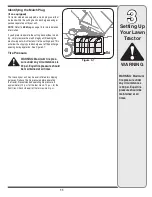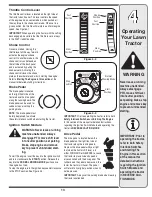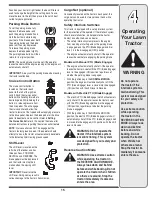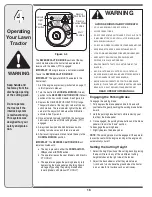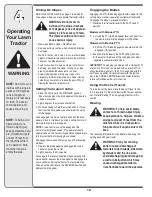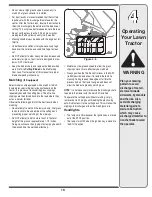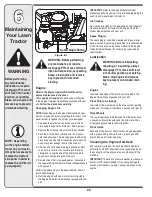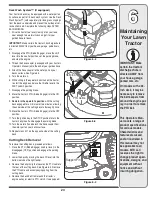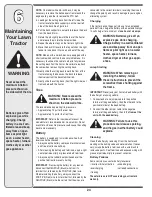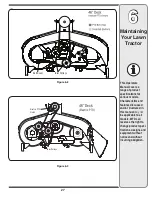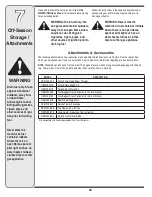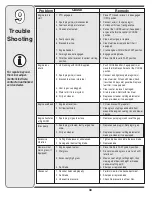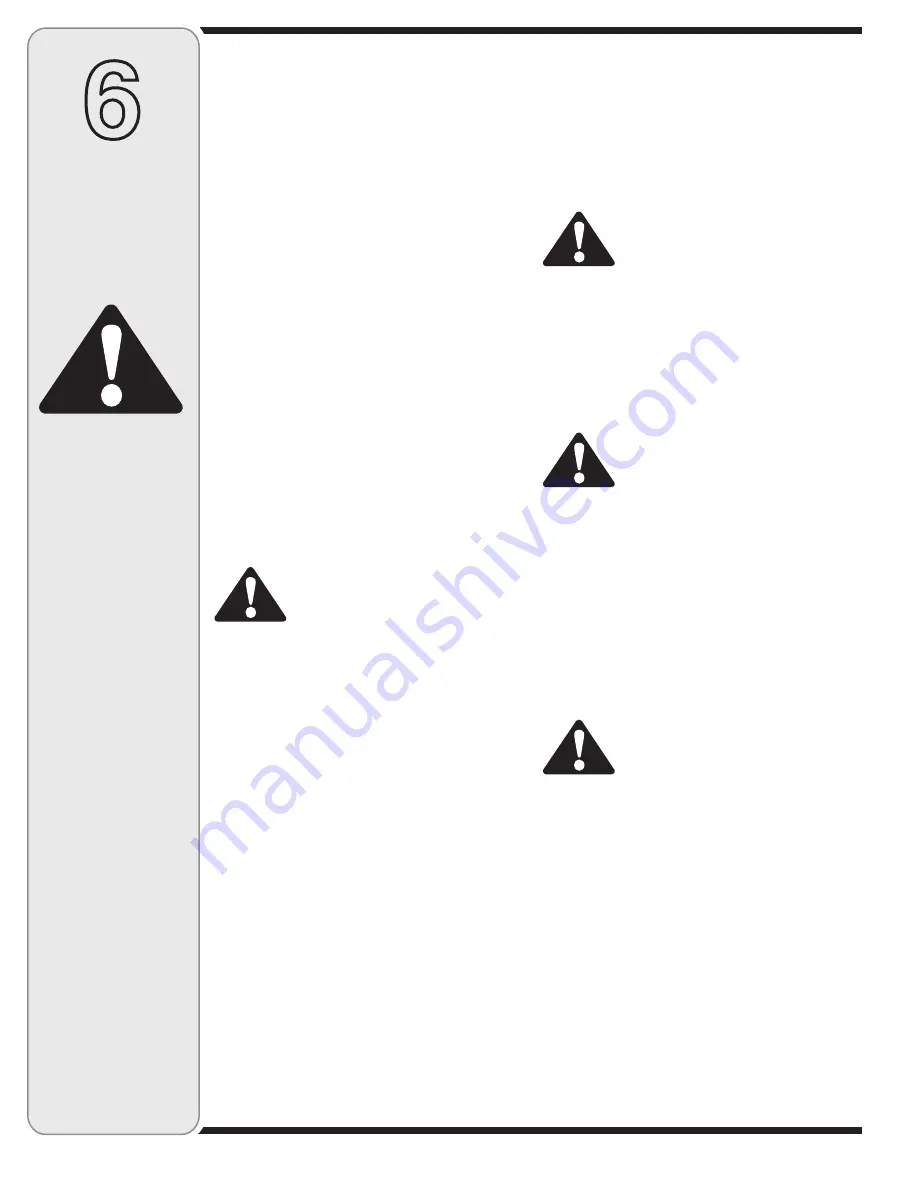
4
6
Maintaining
Your Lawn
Tractor
NOTE:
On models with a 46-inch deck, it may be
necessary to remove the belt keepers from around the
engine pulley, on order to remove the PTO belt.
5. Looking at the cutting deck from the left side of the
tractor, locate the deck support pin on the rear left
side of the deck. See Figure 6-4.
6. Pull the deck support pin outward to release the deck
from the deck lift arm.
7. Rotate the pin slightly toward the rear of the tractor
and release the pin into the hole provided.
8. Repeat the above steps on the tractor’s right side.
9. Move the deck lift lever into the top notch on the right
fender to raise deck lift arms up and out of the way.
NOTE:
Models with a 46-inch deck are equipped with a
short cable which controls the deck spindle brake. It is
necessary to unhook this cable in order to fully remove
the cutting deck from the tractor. Be certain to reattach
the cable when re-mounting the cutting deck.
10. Gently slide the cutting deck toward the front of the
tractor allowing the hooks on the deck to release
themselves from the deck stabilizer rod.
11. Gently slide the cutting deck (from the right side) out
from underneath the tractor.
Tires
WARNING: Never exceed the
maximum inflation pressure
shown on the sidewall of tire.
The recommended operating tire pressure is:
• Approximately 10 psi for the rear tires
• Approximately 14 psi for the front tires
IMPORTANT
: Refer to the tire sidewall for exact tire
manufacturer’s recommended or maximum psi. Do not
overinflate. Uneven tire pressure could cause the cutting
deck to mow unevenly.
Battery
The battery is sealed and is maintenance-free. Acid
levels cannot be checked.
• Always keep the battery cables and terminals clean
and free of corrosive build-up.
• After cleaning the battery and terminals, apply a light
coat of petroleum jelly or grease to both terminals.
• Always keep the rubber boot positioned over the
positive terminal to prevent shorting.
IMPORTANT
: If removing the battery for any reason,
disconnect the NEGATIVE (Black) wire from it’s
terminal first, followed by the POSITIVE (Red) wire.
When reinstalling the battery, always connect the
POSITIVE (Red) wire to its terminal first, followed by the
NEGATIVE (Black) wire. Be certain that the wires are
connected to the correct terminals; reversing them could
change the polarity and result in damage to your engine’s
alternating system.
Charging
If the tractor has not been put into use for an extended
period of time, charge the battery with an automotive-type
12-volt charger for a minimum of
one hour at six amps.
WARNING: Batteries give off an
explosive gas while charging.
Charge battery in a well ventilated
area and keep away from an open
flame or pilot light as on a water
heater, space heater, furnace,
clothes dryer or other gas appli-
ances.
Jump Starting
WARNING: When removing or
installing the battery, follow
these instructions to prevent the
screwdriver from shorting against
the frame.
IMPORTANT
: Never jump your tractor’s dead battery with
the battery of a running vehicle.
1. Connect end of one jumper cable to the positive
terminal of the good battery, then the other end to the
positive terminal of the dead battery.
2. Connect the other jumper cable to the negative
terminal of the good battery, then to the
frame of the
unit with the dead battery.
WARNING: Failure to use this
procedure could cause sparking,
and the gas in either battery could
explode.
Cleaning
Clean the battery by removing it from the tractor and
washing with a baking soda and water solution. If neces-
sary, scrape the battery terminals with a wire brush to
remove deposits. Coat terminals and exposed wiring with
grease or petroleum jelly to prevent corrosion.
Battery Failures
Some common causes for battery failure are:
• incorrect initial activation • undercharging
• overcharging
• corroded connections
• freezing
These failures are NOT covered by your tractor’s
warranty.
WARNING
Never exceed the
maximum inflation
pressure shown on
the sidewall of the tire.
Batteries give off an
explosive gas while
charging. Charge
battery in a well ven-
tilated area and keep
away from an open
flame or pilot light
as on a water heater,
space heater, furnace,
clothes dryer or other
gas appliances.


